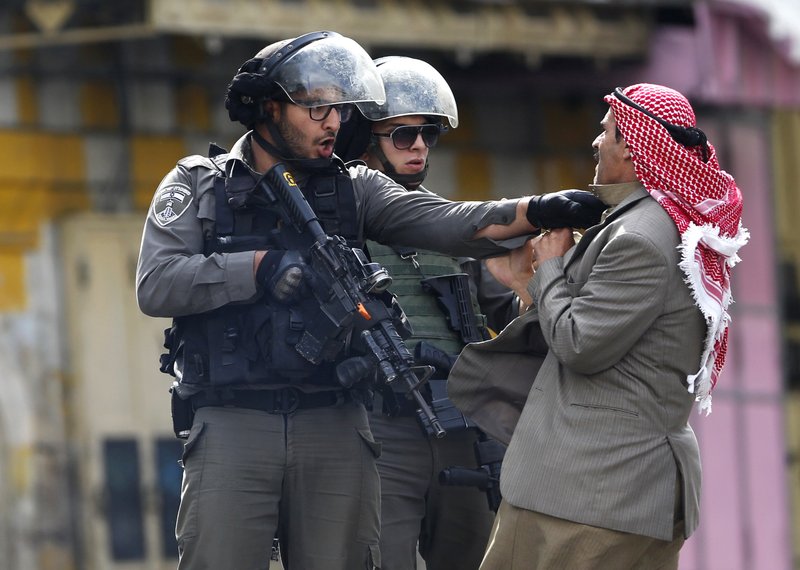HEBRON, West Bank -- The West Bank's largest city has become a focal point of Israeli-Palestinian violence, with near-daily deadly confrontations erupting at Israeli army checkpoints that guard enclaves of Jewish settlers in the once-thriving center of Hebron.
One-third of 58 Palestinians killed by Israeli fire since mid-September were in Hebron, including two Palestinians shot dead Thursday. Eleven Israelis were killed in Palestinian attacks, mostly stabbings, over the same period, though none in Hebron.
Israel says nearly all of those killed in Hebron were knife-wielding attackers, but rights groups have challenged that, saying some did not pose a threat to soldiers' lives.
The events in Hebron are central to the Israeli-Palestinian clash of narratives over the recent violence.
In a confrontation Thursday, police said a 23-year-old Palestinian man stabbed a soldier in the head, wounding him lightly, and then attempted to stab another security officer before Israeli forces shot and killed him. The Palestinian approached soldiers at a checkpoint as clashes between Palestinian protesters and Israeli troops erupted nearby, police said.
Later Thursday, Israeli forces shot and killed another Palestinian who the military said attempted to stab an Israeli soldier. But a Palestinian witness at the scene, community activist Issa Amro, challenged the Israeli account, saying he had not seen a knife. Palestinians have repeatedly accused the army of using unnecessary or excessive force, a charge that Israel denies.
The Israeli military said Thursday that a Palestinian who tried to stab a soldier in the city on Wednesday died after forces shot him.
Israeli Prime Minister Benjamin Netanyahu's government portrays the spate of Palestinian attacks as a "wave of terror" whipped up by anti-Israeli Palestinian incitement.
Netanyahu's critics say this ignores the underlying cause -- nearly a half-century of Israeli military rule with no end in sight. Palestinians "don't grow up with knives in their hands," said Hebron's Yehuda Shaul, a peace activist and former Israeli combat soldier.
Israeli military occupation is felt in its rawest form in this city of 270,000 Palestinians, whose downtown remains under exclusive Israeli control.
There, hundreds of troops guard 850 settlers, making it the only Palestinian population center in the West Bank with a major Israeli army presence.
"People are boiling -- more settler violence, no hope," said Palestinian activist Issa Amro.
Israeli settler spokesman Noam Arnon blames the violence on what he contends is the Palestinians' refusal to accept the presence of Jews and their historic roots in Hebron.
A small group of Palestinian attackers "wants to destroy the life of Jews and Arabs" in the city, he said. He dismissed allegations of systematic settler violence, portraying Palestinians as the main aggressors.
Another ingredient in Hebron's combustible mix is a major shrine that was divided into separate prayer areas for Muslims and Jews in 1995, a year after a settler killed 29 Muslims in a shooting rampage there.
Known to Jews as the Tomb of the Patriarchs, it marks the traditional burial sites of biblical patriarchs. Muslims call it the Ibrahimi Mosque, after Abraham, one of the patriarchs.
The latest violence began in Jerusalem, driven in part by Palestinian fears that Israel plans to divide a major contested shrine there like it did in Hebron. Israel denies such claims.
Initially, many of the attacks involved Palestinians from Arab neighborhoods of Jerusalem. After Israel erected roadblocks in Jerusalem earlier this month, restricting the movement of Palestinians, the momentum shifted to traditionally volatile Hebron.
An interim agreement in the 1990s divided the city, placing the center under full Israeli control and the rest under Palestinian self-rule. The fate of the Hebron settlers was left to a final Israeli-Palestinian peace deal that never materialized. Instead, settlers moved into more buildings and Israel tightened security controls, leading to the current separation regime.
About 10,000 Palestinians live in the area closest to the settler enclaves that are guarded by 18 army checkpoints, said Amro, the Palestinian activist. Palestinians can only use certain streets, while areas near settler compounds are off-limits, he said. Hundreds of small businesses and workshops in the area had to close because customers could no longer reach them.
Shaul, the former soldier and co-founder of Breaking The Silence, a group that collects testimony from army veterans about abuses by troops in the Palestinian territories, said nothing justifies deadly Palestinian attacks, but that public debate in Israel lacks context.
"Anyone who does not understand that the word occupation needs to be at the beginning, middle and end of every sentence [about the current situation] is lying to himself and to the Israeli public," he said.
Information for this article was contributed by Nasser Shiyoukhi, Josef Federman and Tia Goldenberg of The Associated Press.
A Section on 10/30/2015


